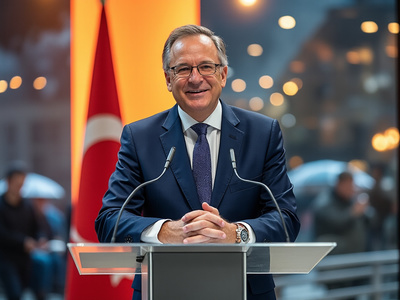
European Parliament Approves Extended Trade Measures for Ukraine
The European Parliament renews trade liberalisation measures for Ukrainian steel, providing critical support amid ongoing conflict.
The European Parliament has approved the extension of the Autonomous Trade Measures (ATM) Regulation, enabling continued trade liberalisation between the European Union and Ukraine.
This measure, initially adopted on June 4, 2022, suspended trade defence measures, with a focus on Ukrainian steel, to bolster the country’s export revenues amidst the ongoing conflict with Russia.
The latest renewal of these measures will be effective for three years, set to expire in June 2028, pending an agreement with the European Council.
The decision, which received 354 votes in favour, 147 against, and 53 abstentions, underscores the EU's commitment to support Ukraine’s economy during a challenging period marked by significant military and economic adversity.
Karin Karlsbro, rapporteur for the proposal, stated during the voting session that Ukraine's steel industry is pivotal to its economy, continuing to operate despite the loss of workers to the frontline and persistent attacks on production facilities caused by the ongoing war.
The European Commission is also exploring long-term solutions to provide economic stability for trade relations between the EU and Ukraine, aiming to enhance mutual benefits from the partnership.
In a related context, significant developments have also emerged in the broader international trade landscape.
The United States and China have reached an agreement to temporarily reduce tariffs by 115% on certain goods from both countries for a period of 90 days.
The U.S. tariffs on Chinese goods will decrease from 145% to 30%, while China's tariffs on American imports will drop from 125% to 10%.
This announcement follows extensive negotiations in Geneva, marking a significant progression in efforts to resolve tensions that have characterized U.S.-China trade relations since 2018.
Both sides have expressed intent to continue dialogue to address economic and trade matters, with U.S. Treasury Secretary Scott Bessent affirming a mutual interest in preventing a complete decoupling of the economies.
Financial markets reacted positively to the announcement, with notable increases in the value of the dollar and stock market indices.
This development stands in contrast to previous tariff escalations initiated by former President Donald Trump, which had raised concerns of a recession and economic instability.
These concurrent trade initiatives highlight the EU's and the U.S.'s strategic positioning in the global economic landscape amid ongoing geopolitical tensions.
This measure, initially adopted on June 4, 2022, suspended trade defence measures, with a focus on Ukrainian steel, to bolster the country’s export revenues amidst the ongoing conflict with Russia.
The latest renewal of these measures will be effective for three years, set to expire in June 2028, pending an agreement with the European Council.
The decision, which received 354 votes in favour, 147 against, and 53 abstentions, underscores the EU's commitment to support Ukraine’s economy during a challenging period marked by significant military and economic adversity.
Karin Karlsbro, rapporteur for the proposal, stated during the voting session that Ukraine's steel industry is pivotal to its economy, continuing to operate despite the loss of workers to the frontline and persistent attacks on production facilities caused by the ongoing war.
The European Commission is also exploring long-term solutions to provide economic stability for trade relations between the EU and Ukraine, aiming to enhance mutual benefits from the partnership.
In a related context, significant developments have also emerged in the broader international trade landscape.
The United States and China have reached an agreement to temporarily reduce tariffs by 115% on certain goods from both countries for a period of 90 days.
The U.S. tariffs on Chinese goods will decrease from 145% to 30%, while China's tariffs on American imports will drop from 125% to 10%.
This announcement follows extensive negotiations in Geneva, marking a significant progression in efforts to resolve tensions that have characterized U.S.-China trade relations since 2018.
Both sides have expressed intent to continue dialogue to address economic and trade matters, with U.S. Treasury Secretary Scott Bessent affirming a mutual interest in preventing a complete decoupling of the economies.
Financial markets reacted positively to the announcement, with notable increases in the value of the dollar and stock market indices.
This development stands in contrast to previous tariff escalations initiated by former President Donald Trump, which had raised concerns of a recession and economic instability.
These concurrent trade initiatives highlight the EU's and the U.S.'s strategic positioning in the global economic landscape amid ongoing geopolitical tensions.
AI Disclaimer: An advanced artificial intelligence (AI) system generated the content of this page on its own. This innovative technology conducts extensive research from a variety of reliable sources, performs rigorous fact-checking and verification, cleans up and balances biased or manipulated content, and presents a minimal factual summary that is just enough yet essential for you to function as an informed and educated citizen. Please keep in mind, however, that this system is an evolving technology, and as a result, the article may contain accidental inaccuracies or errors. We urge you to help us improve our site by reporting any inaccuracies you find using the "Contact Us" link at the bottom of this page. Your helpful feedback helps us improve our system and deliver more precise content. When you find an article of interest here, please look for the full and extensive coverage of this topic in traditional news sources, as they are written by professional journalists that we try to support, not replace. We appreciate your understanding and assistance.










